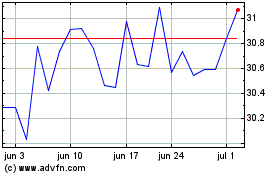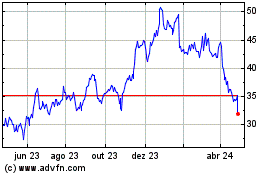Huawei Cancels Laptop Rollout, Citing U.S. Curbs -- WSJ
13 Junho 2019 - 4:02AM
Dow Jones News
By Stu Woo
This article is being republished as part of our daily
reproduction of WSJ.com articles that also appeared in the U.S.
print edition of The Wall Street Journal (June 13, 2019).
HONG KONG -- China's Huawei Technologies Co. has canceled the
launch of a new laptop and paused production at its
personal-computer business because of restrictions on buying U.S.
components, according to a person familiar with the matter.
The moves mark Huawei's first tangible setback from the U.S.
Commerce Department's move to ban American companies from selling
supplies to the Chinese company, while also demonstrating the
importance of American businesses in the global personal-computing
supply chain.
Huawei, the world's No. 2 smartphone brand, has a relatively
small and new personal-computer business. It makes three laptops,
the first of which made its debut in 2016. It relies on Microsoft
Corp.'s Windows operating system and Intel Corp.'s chips.
The head of Huawei's consumer business, Richard Yu, told CNBC on
Wednesday that the Commerce Department caused the company to cancel
its new laptop launch, adding that it may never release that
product if it remains on the Commerce Department's blacklist. The
news site the Information had reported the cancellation
earlier.
The Commerce Department banned American companies from selling
components to Huawei over national-security concerns, though it has
granted suppliers 90-day exemptions. U.S. officials say Beijing
could order Huawei to tap into the hardware it makes to spy or
disable communications. Huawei says those accusations are
groundless.
The U.S. offensive is focused on Huawei's core business, which
is making cellular-tower hardware, internet routers and other
telecom equipment. Washington has banned such electronics in the
U.S. and is campaigning for allied countries to blacklist them
too.
Huawei also has an ambitious consumer division, which accounted
for 45% of its revenue in 2018. Its executives had previously said
they aimed to eclipse Samsung Electronics Co. as the world's top
smartphone brand. But the Commerce Department's blacklisting could
stop Huawei from using some versions of Android, the world's
dominant operating system, and other software from Alphabet Inc.'s
Google on its phones. That could affect sales in Europe, where
Huawei is popular, but where people also rely on Google apps, said
IDC analyst Francisco Jeromino.
"If we had not encountered anything unexpected, we would have
become No. 1 by the fourth quarter" of this year, said Shao Yang,
chief strategy officer of Huawei's consumer business, at a
conference on Tuesday. "We have to wait a bit longer to achieve
that."
The company is trying to make smartphones without American
components. It recently trademarked its own operating system,
called Hongmeng, to replace Android, and Mr. Yu, the Huawei
executive, has said it could be ready for use in China by the end
of the year. Huawei has also invested heavily in a subsidiary that
makes smartphone chips.
Compared with its smartphone business, Huawei has approached the
laptop industry with a beginner's restraint. "Today we are not
targeting, top one, top two, top three like that, because we are a
newcomer to this industry," Mr. Yu said in a May 2017
interview.
Write to Stu Woo at Stu.Woo@wsj.com
(END) Dow Jones Newswires
June 13, 2019 02:47 ET (06:47 GMT)
Copyright (c) 2019 Dow Jones & Company, Inc.
Intel (NASDAQ:INTC)
Gráfico Histórico do Ativo
De Mar 2024 até Abr 2024

Intel (NASDAQ:INTC)
Gráfico Histórico do Ativo
De Abr 2023 até Abr 2024
